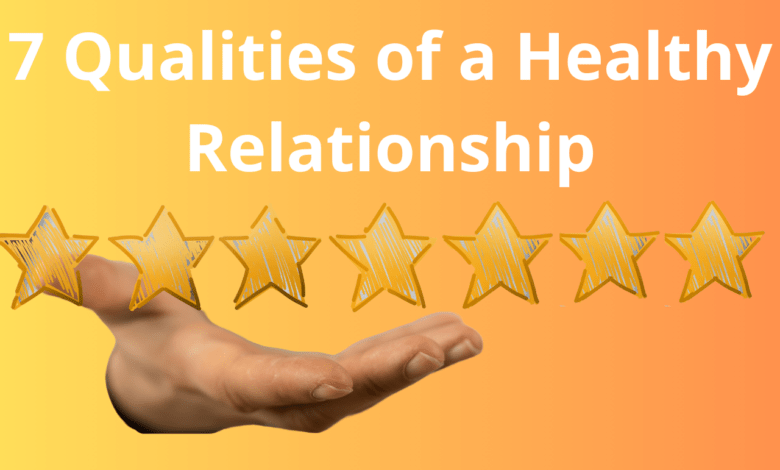7 Qualities of a Healthy Relationship: Building Strong Foundations for Lasting Love

“7 Qualities of a Healthy Relationship” Relationships shape our lives, influencing our experiences and providing belonging and purpose. Whether romantic, familial, or platonic, healthy relationships are vital for our well-being and growth. In this article, we explore seven essential qualities that build strong, lasting relationships.
Every relationship is unique with its own challenges and triumphs. By cultivating these seven qualities, we foster trust, respect, and mutual understanding, leading to a more rewarding bond.
Relationships are a journey requiring effort, patience, and growth. Embracing these qualities builds a solid foundation to weather life’s storms and allows our hearts and souls to thrive.
Communication Openness
Effective communication is the lifeblood of any healthy relationship. It is the bridge that connects our thoughts, feelings, and experiences, allowing us to understand each other on a deeper level. Open and honest communication creates an environment of trust and transparency, where both parties feel safe to express themselves without fear of judgment or criticism.
In a relationship characterized by communication openness, we actively listen to our partner, seeking to understand their perspective and validating their emotions. We engage in respectful dialogue, even when we disagree, and strive to find common ground and compromise. By fostering an open and honest exchange of thoughts and feelings, we can address conflicts before they escalate and strengthen our emotional connection.
Furthermore, open communication extends beyond the realm of words. It encompasses non-verbal cues, body language, and the ability to read between the lines. When we are truly present and attentive to our partner, we can decipher the unspoken messages and respond with empathy and understanding.
Trust and Transparency
Trust is the foundation upon which healthy relationships are built. It is the belief that our partner has our best interests at heart and that they will be faithful, reliable, and truthful in their words and actions. Trust is not blind faith; it is earned through consistent behavior and a commitment to transparency.
In a relationship rooted in trust and transparency, we are open and honest about our thoughts, feelings, and actions. We do not hide or conceal information that could potentially impact our partner or the relationship. We acknowledge our vulnerabilities and mistakes, and we work together to address them in a constructive manner.
Transparency also extends to our personal lives and boundaries. We are clear about our needs, expectations, and limitations, and we respect our partner’s right to do the same. By fostering an environment of trust and transparency, we create a safe space where we can be our authentic selves without fear of judgment or betrayal.
Mutual respect and support
Respect is the cornerstone of any healthy relationship. It is the acknowledgment of our partner’s inherent worth, their values, beliefs, and boundaries. Respect manifests itself in the way we communicate, the way we treat each other, and the way we honor each other’s individuality.
In a relationship characterized by mutual respect, we value our partner’s opinions, aspirations, and goals. We celebrate their achievements and support their personal growth, even when it means making sacrifices or compromises. We do not belittle or demean our partner, but rather, we uplift and encourage them to be their best selves.
Support is an essential component of respect. It is the willingness to be there for our partner, to offer a listening ear, a shoulder to lean on, and a helping hand when needed. By supporting each other through life’s challenges and triumphs, we create a strong foundation of trust, empathy, and understanding.
Empathy and Understanding
Empathy is the ability to understand and share the feelings of another. It is the cornerstone of emotional intelligence and a vital component of any healthy relationship. When we empathize with our partner, we put ourselves in their shoes, seeking to comprehend their perspective, emotions, and experiences without judgment or bias.
In a relationship characterized by empathy and understanding, we actively listen to our partner’s concerns and validate their emotions. We do not dismiss or minimize their feelings, but rather, we acknowledge and respect them. By cultivating empathy, we create an environment of emotional safety, where our partner feels heard, understood, and valued.
Understanding goes hand in hand with empathy. It is the willingness to learn about our partner’s background, beliefs, and experiences, and to appreciate how these factors shape their worldview. By seeking to understand our partner’s unique perspective, we can bridge the gap between our differences and find common ground.
Support and Encouragement
Healthy relationships thrive on the foundation of mutual support and encouragement. When we support our partner, we provide them with the emotional, mental, and sometimes physical resources they need to navigate life’s challenges and pursue their dreams.
Support can take many forms, from offering a listening ear and a shoulder to lean on, to actively assisting with tasks or responsibilities. It is the willingness to be present and engaged, to celebrate our partner’s successes, and to uplift them during times of struggle or uncertainty.
Encouragement is the fuel that propels our partner forward, igniting their passion and inspiring them to reach for their goals. It is the belief in their abilities, the recognition of their strengths, and the gentle nudge they need to step out of their comfort zone and embrace new opportunities.
By providing unwavering support and encouragement, we create an environment of positivity and growth, where our partner feels empowered to pursue their aspirations and reach their full potential.
Healthy Conflict Resolution:
Conflict is an inevitable part of any relationship, and how we approach and resolve these conflicts can either strengthen or weaken our bond. Healthy conflict resolution is a crucial quality that distinguishes a thriving relationship from a dysfunctional one.
In a relationship characterized by healthy conflict resolution, we approach disagreements with an open mind and a willingness to compromise. We do not resort to personal attacks, blame games, or emotional manipulation. Instead, we focus on addressing the issue at hand, actively listening to each other’s perspectives, and seeking mutually beneficial solutions.
Effective communication is the cornerstone of healthy conflict resolution. We express our thoughts and feelings clearly and respectfully, without raising our voices or resorting to hurtful language. We also practice active listening, seeking to understand our partner’s point of view and validating their emotions.
Compromise is another essential element of healthy conflict resolution. We recognize that not every disagreement can be resolved in a way that satisfies both parties completely. However, by being willing to meet each other halfway and find common ground, we can reach a resolution that acknowledges and respects both perspectives.






